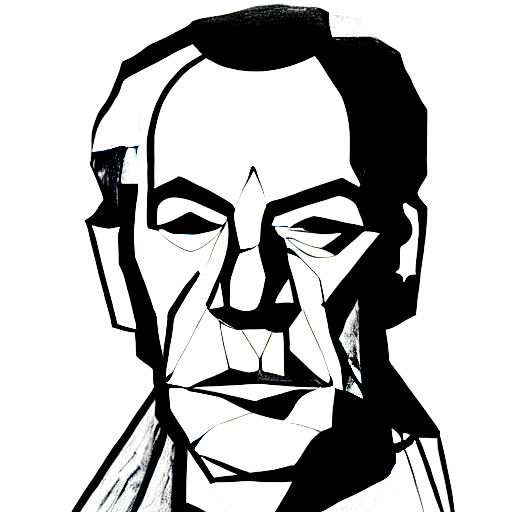John Marcellus Huston (August 5, 1906 – August 28, 1987) was an American actor, director, screenwriter and visual artist. He traveled widely, settling at various times in France, Mexico, and Ireland. Huston was a citizen of the U.S. by birth but renounced this to become an Irish citizen and resident in 1964. He later returned to the U.S., where he lived the rest of his life. He wrote the screenplays for most of the 37 feature films he directed, many of which are today considered classics: The Maltese Falcon (1941), The Treasure of the Sierra Madre (1948), The Asphalt Jungle (1950), The African Queen (1951), The Misfits (1961), Fat City (1972), The Man Who Would Be King (1975) and Prizzi's Honor (1985).
In his early years, Huston studied and worked as a fine art painter in Paris. He then moved to Mexico and began writing, first plays and short stories, and later working in Los Angeles as a Hollywood screenwriter, and was nominated for several Academy Awards writing for films directed by William Dieterle and Howard Hawks, among others. His directorial debut came with The Maltese Falcon, which despite its small budget became a commercial and critical hit; he would continue to be a successful, if iconoclastic, Hollywood director for the next 45 years. He explored the visual aspects of his films throughout his career, sketching each scene on paper beforehand, then carefully framing his characters during the shooting. While most directors rely on post-production editing to shape their final work, Huston instead created his films while they were being shot, with little editing needed. Some of Huston's films were adaptations of important novels, often depicting a "heroic quest," as in Moby Dick, or The Red Badge of Courage. In many films, different groups of people, while struggling toward a common goal, would become doomed, forming "destructive alliances," giving the films a dramatic and visual tension. Many of his films involved themes such as religion, meaning, truth, freedom, psychology, colonialism, and war.
While he had done some stage acting in his youth and had occasionally cast himself in bit parts in his own films, he primarily worked behind the camera until Otto Preminger cast him in 1963's The Cardinal, for which he was nominated for an Academy Award. He continued to take prominent supporting roles for the next two decades, including 1974's Chinatown (directed by Roman Polanski), and he lent his booming baritone voice as a voice actor and narrator to a number of prominent films. His last two films, 1985's Prizzi's Honor, and 1987's The Dead, filmed while he was in failing health at the end of his life, were both nominated for multiple Academy Awards. He died shortly after completing his last film.
Huston has been referred to as "a titan", "a rebel", and a "renaissance man" in the Hollywood film industry. Author Ian Freer describes him as "cinema's Ernest Hemingway"—a filmmaker who was "never afraid to tackle tough issues head on." During his 46-year career, Huston received 15 Oscar nominations, winning twice. He directed both his father, Walter Huston, and daughter, Anjelica Huston, to Oscar wins.
Sol turns thousands of years of human wisdom from the world’s spiritual traditions into a totally unique personality profile. To get your own profile, check compatibility with friends and much more, download the Sol App today.
Some of their strengths
John Huston has many admirable traits.
Based on spiritual traditions from around the world, they are someone who can be described as Passionate, Intense, Confident, Extroverted, Intelligent, Idealistic, and Easygoing.
Bold and Confident
According to Mysticism’s Astrology tradition, John Huston is someone who is a bold, confident, energetic, and optimistic person, who is able to combine personal warmth and charisma with intelligence. A person who is ambitious and motivated.
Charming and Sophisticated
Based on Daoism’s Ba-Zi or ‘Chinese Zodiac’ tradition, people who know John Huston well know them as someone who can be classy, glamorous, and worldly, like jewelry.
Courteous and Easygoing
According to Hinduism’s Jyotisha or ‘Vedic Astrology’ tradition, many would also describe John Huston as someone who is polite, modest, and diplomatic.
A person who tends to be socially popular, who loves intellectual or creative activities, who has a talent for communicating with and understanding the needs of others, and who seems to have a knack for getting recognized for their efforts.
Charismatic and Instinctual
Based on the Mayan Tzolk’in or ‘Mayan Astrology’ tradition, John Huston is someone who handles stress better than most people, and who tends to have a powerful charisma and convictions.
They are also someone who is balanced, stable, and energetic, who likes the idea of home and family, and who is very comfortable being the person in charge.
Creative and Leadership-oriented
According to Judaism’s Kabbalah tradition, John Huston tends to be someone who is a natural leader, with determination, motivational powers, and who takes obligations seriously. Who has charisma, a sense of humor, and who tends to attract attention.
Some of John Huston's challenges
While John Huston has many strengths, nobody is perfect. They also have some challenging traits they need to manage.
For example, John Huston can be Arrogant, Status-seeking, Rebellious, Emotionally Distant, Complicated, Brusque, and Indecisive.
Arrogant and Status-seeking
One of John Huston's key challenges is that they are someone who can come across as arrogant and status-seeking.
John Huston must also exercise caution as they can be short-tempered and aggressive.
Indecisive and Materialistic
John Huston is someone who can be indecisive, indulgent, and materialistic, who can have difficulty focusing on a single career or profession, have difficulty following orders or respecting authority, and who can suffer from "analysis paralysis".
Domineering and Stubborn
Finally, John Huston also can be too rebellious, not respond to criticism well, and be too emotional and extreme about things.

